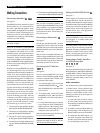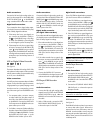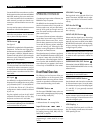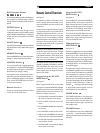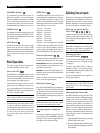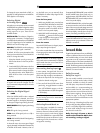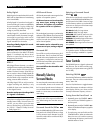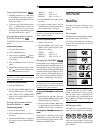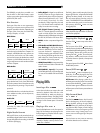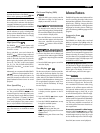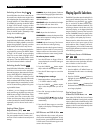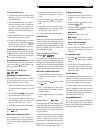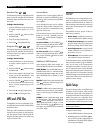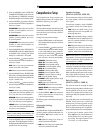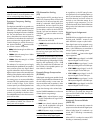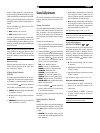
24
RSDX-02 DVD Receiver
The RSDX-02 can play discs encoded in ei-
ther the NTSC or PAL video formats, output-
ting the correct video signal as set by the back-
panel NTSC/PAL switch.
Disc Structure
Each type of disc has its own organization,
allowing you to locate various portions of the
program recorded on the disc. Depending on
the type of disc, these may be called
Titles,
Groups, Chapters,
or
Tracks:
DVD-Video:
Chapter 1 Chapter 2 Chapter 1 Chapter 2
Title 1 Title 2
A DVD-Video disc is comprised of
Titles
and
each title may be divided into
Chapters
. For
example, a DVD-Video disc may contain sev-
eral movies, each with its own
Title
number,
and each movie may be divided into several
Chapters
. In a DVD-Video karaoke disc, each
song usually has its own title number and does
not have
Chapters
.
DVD-Audio:
Track 1 Track 2 Track 3 Track 1 Track 2
Group 1
Group 2
A DVD-Audio disc contains
Groups
, with each
group divided into
Tracks
. Some DVD-Audio
discs also contain a
Bonus Group
that can only
be played back by entering a
Key Number
password.
Most DVD-Audio discs include other informa-
tion in addition to audio, such as still pictures,
movies and text.
Audio CD:
Track 1 Track 2 Track 3
An Audio CD, Video CD or SVCD simply
contains
Tracks
.
Digital Audio Formats
DVD and CD discs can be encoded with sev-
eral different digital audio formats. Generally,
the type of digital audio encoding is indicated
on the disc packaging.
• Dolby Digital. A digital surround format
that may contain as many as five discrete
audio channels plus an LFE (low frequency
effects) channel (referred to as 5.1 chan-
nel surround). Particularly for older
soundtracks, Dolby Digital may be used
for a 2.0 channel stereo soundtrack with
Dolby Surround matrix encoding.
• DTS (Digital Theater Systems). An-
other 5.1 channel digital surround format
similar to Dolby Digital, but somewhat
different encoding characteristics. Also plays
the DTS 96/24 used on DTS music discs.
• MPEG. Another compressed digital for-
mat.
• DVD-Audio and MLP (Meridian Loss-
less Packing). A high quality digital
format for DVD-Audio with the compres-
sion ratio of about 2:1 supporting up to
192kHz sampling rate and 24-bit resolu-
tion, allowing the PCM signal to be recre-
ated without loss. Some content may only
be available at the analog outputs.
• LPCM (Linear PCM). Uncompressed digi-
tal audio, the format used on CDs and most
studio masters.
• MP3 (MPEG 1, Layer 3). Compressed
2-channel digital audio, a format often used
for music on recordable CD-R and CD-RW
discs.
Playing DVDs
Inserting a Disc
P3-G
A disc drawer slides out to accept a disc and
retracts for playback. Place the disc in the
drawer label-side up. Make sure the disc is
properly centered in the tray. The OPN/CLOSE
button on the front panel or the EJECT button
on Page 3 of the remote opens or closes the
drawer.
Playing a Disc
Press the PLAY button on the front panel or
Page 3 of the remote to start playing the disc
from the beginning. If the disc drawer is open,
it will close automatically.
NOTE
: Many DVDs either begin playing auto-
matically or display a start-up menu as soon
as the disc is inserted.
The PLAY button usually starts play from the
beginning of the disc, except after the PAUSE
button has been pressed. In this case, the
disc will resume playing from the current lo-
cation. The RSDX-02 also has a RESUME fea-
ture that restarts play at the current location
after pressing the STOP
button one time
during playback.
NOTE
: Pressing the PLAY button during DVD-
Video playback skips back about 10 seconds
and resumes playback.
Stopping Disc Playback
Press the STOP button to stop a disc that is
playing.
The first press of the STOP
button memo-
rizes the point at which the disc stopped playing
as indicated by RESUME appearing in the front
panel display. Resume play at that point by
pressing the PLAY
button. This stored posi-
tion remains in memory until the unit is turned
off, the disc drawer is opened, or the top menu
is selected.
The second press of the STOP
button clears
the RESUME position.
Pause/Still Frame
Press the PAUSE button to temporarily sus-
pend play. To resume playing the disc from
the current location, press the PLAY
button.
Still-Frame: When playing a video disc, a
still-frame picture remains on the TV screen with
no sound when the PAUSE
button is pressed.
Press the button again to advance to the next
still-frame picture. Each button press advances
one frame.
Skip forward/back
The TRACK buttons skip forward/
back to the beginning of the next selection.
During playback, pressing the right TRACK
button once advances to the begin-
ning of the next
Title, Chapter,
or
Track
. Pressing
the left button returns to the beginning of the
current scene or song. Pressing twice in suc-
cession returns to the beginning of the previ-
ous track.
Press the button as many times as necessary
to find the desired scene or selection.



